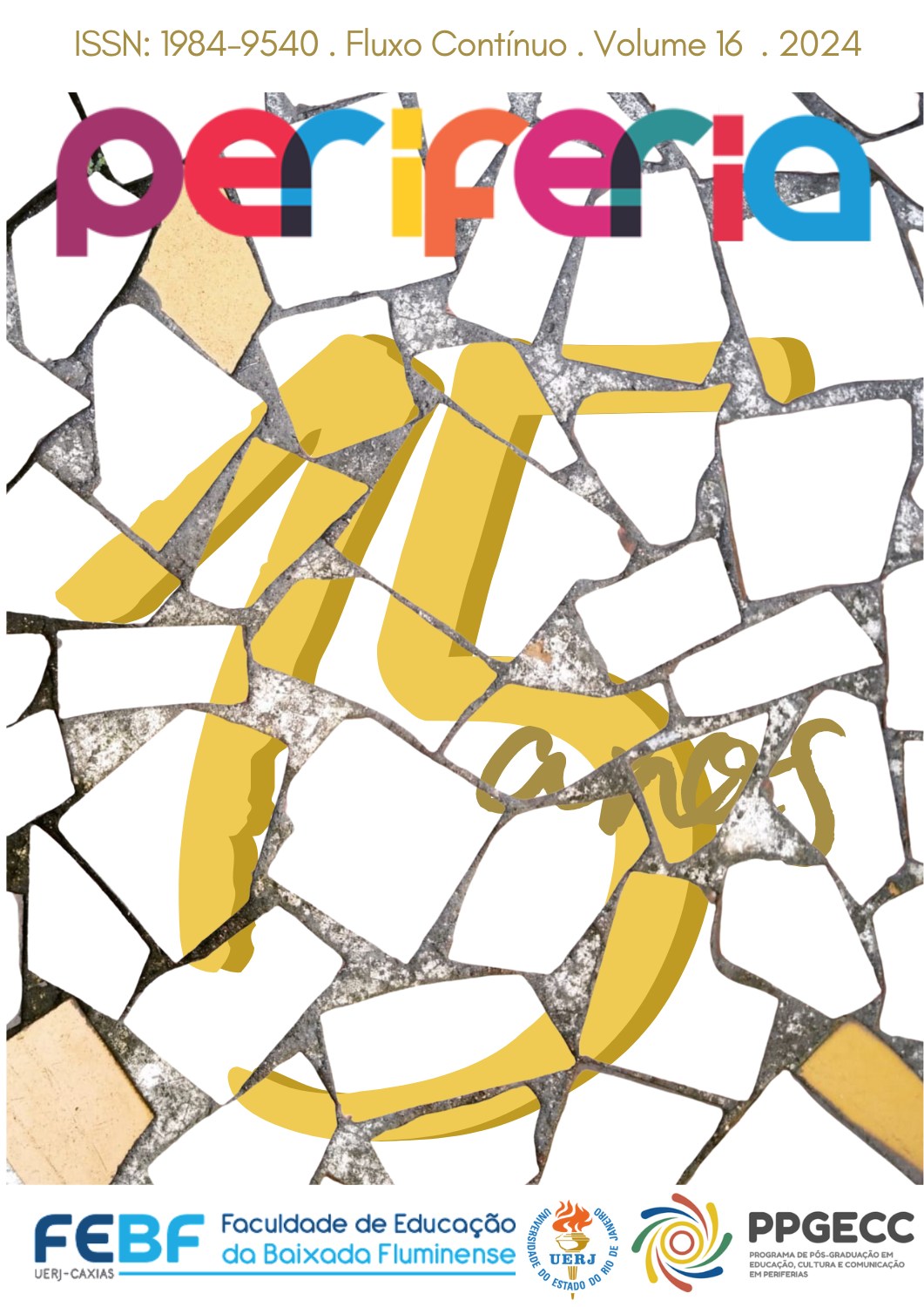DESVELANDO SILENCIOS
Historias y resistencias de mujeres negras periféricas
DOI:
https://doi.org/10.12957/periferia.2024.85896Palabras clave:
Silencios, Mujeres negras, Cuentos, Escrevivência, ResistenciaResumen
El artículo aborda, desde una perspectiva conceptual, el proceso de silenciamiento de las mujeres negras en la sociedad, con un enfoque en las experiencias de niñas y mujeres negras periféricas, cuyas historias son frecuentemente invisibilizadas, desestimadas y consideradas indignas de ser narradas, vividas o escuchadas. Este estudio cualitativo emplea la “escrevivência” de Conceição Evaristo como método para acceder a las voces y vivencias de nueve niñas negras periféricas, con edades entre 12 y 15 años, residentes en la comunidad São Pedro, en Vitória-ES, explorando sus sueños y desafíos cotidianos frente al racismo estructural. El objetivo central es comprender cómo el silencio ha sido históricamente impuesto a las voces negras, particularmente a las de las mujeres, y los impactos de este proceso en sus narrativas y representaciones sociales. Para ello, el estudio busca romper los silencios arraigados, visibilizar estas vivencias, compartir sus historias y analizar formas de resistencia y sueños que configuran sus trayectorias. Referencias teóricas de Grada Kilomba, Audre Lorde y Lélia Gonzalez subrayan la importancia de la palabra y la enunciación como herramientas para enfrentar el control y la censura que sostienen la invisibilidad y deshumanización de las personas negras. El texto concluye enfatizando la urgencia de enfrentar el miedo y el silencio, promoviendo la amplificación de las voces de la población negra, especialmente de las mujeres, y animándolas a compartir sus historias desde sus propias perspectivas. Además, desafía las estructuras de poder que perpetúan el silenciamiento, abogando por la valorización y visibilidad de las narrativas negras como parte esencial de la transformación social.
Citas
ADICHIE, Chimamanda Ngozi. O perigo de uma história única. São Paulo: Companhia das Letras, 2019.
AKOTIRENE, Carla. O que é interseccionalidade?. Coleção Feminismos Plurais. Belo Horizonte: Letramento: Justificando, 2020.
CARNEIRO, Sueli. Dispositivo de Racialidade: a construção do outro como não ser como fundamento do ser. ED Zahar, Rio de Janeiro, 2023.
CRENSHAW, Kimberlé. Documento para o encontro de especialistas em aspectos da discriminação racial relativos ao gênero. Revista Estudos Feministas, v. 10, n. 1, p 175, 2002. Disponível em: https://periodicos.ufsc.br/index.php/ref/article/view/S0104-026X2002000100011/0. Acesso em: 30maio. 2024.
CRUZ, Rosângela Aparecida Cardoso da. Gênero e educação nas escrevivências de Conceição Evaristo: um olhar sobre Ponciá Vicêncio e Becos da Memória. In: Anais do V Simpósio Internacional em Educação Sexual, 2017.
EVARISTO, Conceição. Poemas da recordação e outros movimentos. Rio de Janeiro: Malê, 2017.
FALCÃO, Muriel Rodrigues. Educadores negras falando de silêncios: veredas e Encruzilhadas. 105f. Dissertação, Programa de Pós-Graduação em Psicologia Institucional. (Mestrado em Psicologia Institucional), Universidade Federal do
Espírito Santo, Vitória, 2023.
GONZALÉZ, Lélia. Por um Feminismo Afro-Latino-Americano: Ensaios, Intervenções e Diálogos (Orgs). Rio Janeiro: Zahar, 2020.
hooks, bell. A margem como um espaço de abertura radical. Anseios: Raça, gênero e políticas culturais. ed. Elefante. São Paulo: 2019c.
hooks, bell. Ensinando pensamento crítico: sabedoria prática. São Paulo: Elefante. 2020.
JESUS, Carolina Maria de.Quarto de despejo: diário de uma favelada. 10. ed. São Paulo: Ática, 2014.
KILOMBA, Grada. Memórias da plantação: episódios de racismo cotidiano. Rio de Janeiro: Cobogó, 2019.
LORDE, A. Irmã outsider. Tradução: Stephanie Borges. 1.ed. Belo Horizonte: Autêntica Editora, 2019.
MINAYO, Maria. O desafio do conhecimento: pesquisa qualitativa em saúde. 12. ed. São Paulo: Hucitec-Abrasco, 2010.
SALES, Franciely Alves. Vozes-meninas negras: escrevivendo sonhos (in)cessantes. 116f. Dissertação, Programa de Pós-Graduação em Psicologia Institucional. (Mestrado em Psicologia Institucional), Universidade Federal do Espírito Santo, Vitória, 2023.
SOARES, Lissandra Vieira; MACHADO, Paula Sandrine. "Escrevivências" como ferramenta metodológica na produção de conhecimento em Psicologia Social. Rev. psicol. polít., São Paulo , v. 17, n. 39, p. 203-219, ago. 2017 . Disponível em <http://pepsic.bvsalud.org/scielo.php?script=sci_arttext&pid=S1519-549X2017000200002&lng=pt&nrm=iso>. acessos em 04 maio. 2024.
SPIVAK, Gayatri Chakravony. Pode o subalterno falar?. Belo Horizonte: Editora UFMG,2010.
Descargas
Publicado
Cómo citar
Número
Sección
Licencia
Los autores que publican en esta revista concuerdan con los siguientes términos:Los autores mantienen los derechos de autor y conceden a la revista el derecho de primera publicación, con el trabajo simultáneamente licenciado bajo la Creative Commons Attribution License que permite el compartir el trabajo con reconocimiento de la autoría del trabajo y publicación inicial en esta revista.
Los autores tienen autorización para asumir contratos adicionales por separado, para distribución no exclusiva de la versión del trabajo publicada en esta revista (por ejemplo, publicar en repositorio institucional o como capítulo de libro), con reconocimiento de autoría y publicación inicial en esta revista.
Los autores tienen permiso y son estimulados a publicar y distribuir su trabajo en línea (por ejemplo, en repositorios institucionales o en su página personal) a cualquier punto antes o durante el proceso editorial, ya que esto puede generar cambios productivos, así como aumentar el impacto y la cita del trabajo publicado (ver el efecto del acceso libre).



